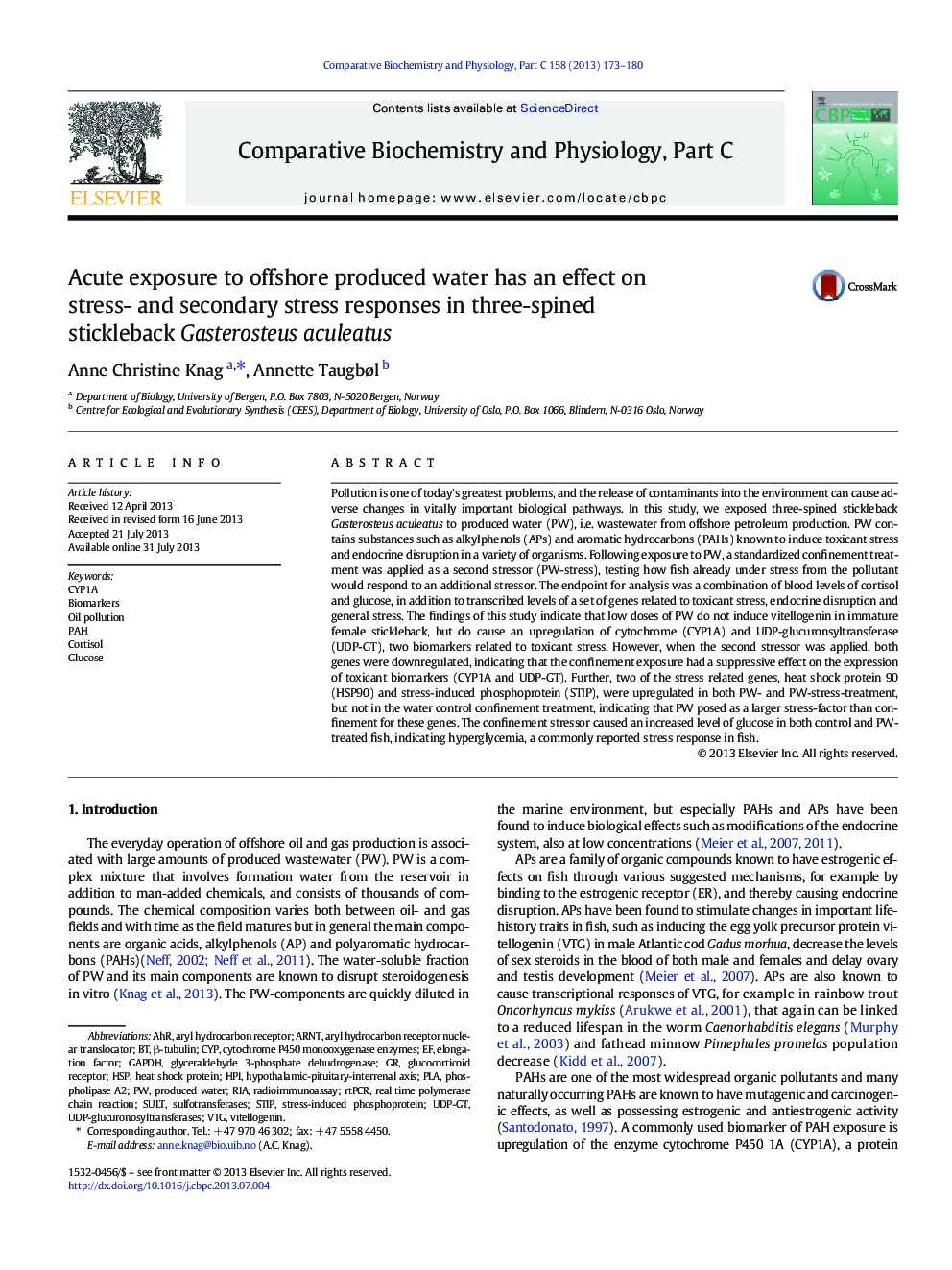| کد مقاله | کد نشریه | سال انتشار | مقاله انگلیسی | نسخه تمام متن |
|---|---|---|---|---|
| 10821636 | 1061482 | 2013 | 8 صفحه PDF | دانلود رایگان |
عنوان انگلیسی مقاله ISI
Acute exposure to offshore produced water has an effect on stress- and secondary stress responses in three-spined stickleback Gasterosteus aculeatus
ترجمه فارسی عنوان
قرار گرفتن در معرض آلودگی به آب تولید شده در دریای خزر بر تأثیرات استرس و استرس ثانویه تاکید می کند. گاستروستئوس آکلاوتوس
دانلود مقاله + سفارش ترجمه
دانلود مقاله ISI انگلیسی
رایگان برای ایرانیان
کلمات کلیدی
AHRSTIPUDP-GTSULTRTPCRARNTRIAHspCYP1AVitellogeninβ-tubulinGAPDHhpiPAHPLACyPUDP-glucuronosyltransferases - UDP-گلوکورونوزیل ترانسفرازProduced water - آب تولید شده، آب تولیدیOil pollution - آلودگی نفتیphospholipase A2 - آنزیم فسفولیپاز A2 aryl hydrocarbon receptor nuclear translocator - اتمسفر هسته ای گیرنده آرویل کربنradioimmunoassay - رادیوایمونواسیSulfotransferases - سولفات ترانسفرازelongation factor - ضریب انقباضBiomarkers - نشانگر زیستی یا بیومارکرReal time polymerase chain reaction - واکنش زنجیره ای پلیمراز واقعی در زمان واقعیvtg - ویتگHeat shock protein - پروتئین شوک حرارتcortisol - کورتیزولGlucose - گلوکزaryl hydrocarbon receptor - گیرنده آرویل هیدروکربنglucocorticoid receptor - گیرنده گلوکوکورتیکوئید
موضوعات مرتبط
علوم زیستی و بیوفناوری
بیوشیمی، ژنتیک و زیست شناسی مولکولی
زیست شیمی
چکیده انگلیسی
Pollution is one of today's greatest problems, and the release of contaminants into the environment can cause adverse changes in vitally important biological pathways. In this study, we exposed three-spined stickleback Gasterosteus aculeatus to produced water (PW), i.e. wastewater from offshore petroleum production. PW contains substances such as alkylphenols (APs) and aromatic hydrocarbons (PAHs) known to induce toxicant stress and endocrine disruption in a variety of organisms. Following exposure to PW, a standardized confinement treatment was applied as a second stressor (PW-stress), testing how fish already under stress from the pollutant would respond to an additional stressor. The endpoint for analysis was a combination of blood levels of cortisol and glucose, in addition to transcribed levels of a set of genes related to toxicant stress, endocrine disruption and general stress. The findings of this study indicate that low doses of PW do not induce vitellogenin in immature female stickleback, but do cause an upregulation of cytochrome (CYP1A) and UDP-glucuronsyltransferase (UDP-GT), two biomarkers related to toxicant stress. However, when the second stressor was applied, both genes were downregulated, indicating that the confinement exposure had a suppressive effect on the expression of toxicant biomarkers (CYP1A and UDP-GT). Further, two of the stress related genes, heat shock protein 90 (HSP90) and stress-induced phosphoprotein (STIP), were upregulated in both PW- and PW-stress-treatment, but not in the water control confinement treatment, indicating that PW posed as a larger stress-factor than confinement for these genes. The confinement stressor caused an increased level of glucose in both control and PW-treated fish, indicating hyperglycemia, a commonly reported stress response in fish.
ناشر
Database: Elsevier - ScienceDirect (ساینس دایرکت)
Journal: Comparative Biochemistry and Physiology Part C: Toxicology & Pharmacology - Volume 158, Issue 3, September 2013, Pages 173-180
Journal: Comparative Biochemistry and Physiology Part C: Toxicology & Pharmacology - Volume 158, Issue 3, September 2013, Pages 173-180
نویسندگان
Anne Christine Knag, Annette Taugbøl,
